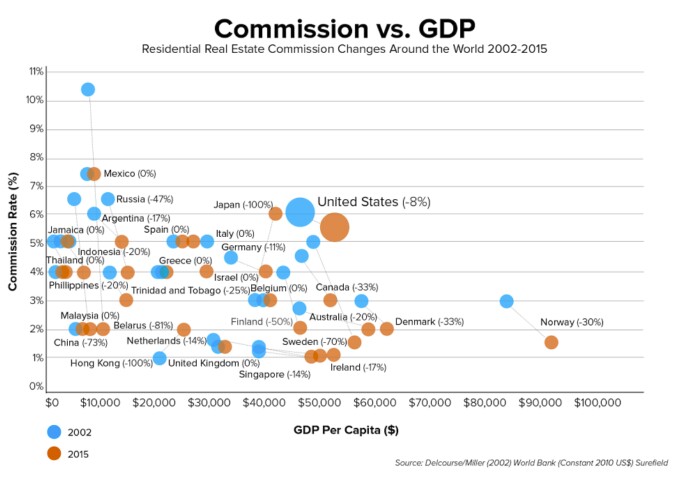A couple of weeks ago I wrote about those allegations of conspiracy and collusion. No, not Russian interference in our election. I’m talking about that class action lawsuit regarding alleged price fixing with regard to real estate commissions. It centers around cooperating (buy side) commissions – why they are needed and how they are priced. The issues raised and the discussion around this topic really highlight some of the confusion and misinformation out there regarding these things. So let me try to put this all in perspective.
Who Pays The Cooperating Commission?
Realtors love to tell home buyers that their agents don’t cost them anything because the seller is paying for it. While it’s technically true that this cooperating commission is packaged into the seller’s total commission and you will see it come out of their proceeds on the closing statement there is a bit more to the story.
In reality that coop commission is more like a concession offered to the buyer which is usually used to pay the buyer’s agent. If the buyer chooses not to use a realtor or allows the listing agent to represent them under dual agency then that money either goes into the listing agent’s pocket or the seller’s pocket (see my previous post about dual agency and variable rate commissions). If it goes into the seller’s pocket then the seller may view the buyer’s offer more favorably than an offer from a buyer with a realtor to pay. In that case, using a real estate agent really has a cost to the buyer in so much as they are foregoing that favorable treatment.
Or, if the buyer is smart, they will work with an agent that gives commission rebates and then they will pocket a good chunk of that commission. Again, if the buyer works with a realtor that doesn’t offer a commission rebate then there is a real cost to that buyer of working with that agent.
The bottom line is that in many circumstances there is a real cost to the home buyer of using a realtor. If the seller didn’t have to provide that incentive they might be willing to accept a lower offer from the buyer. Indirectly, some or all of the buyer agent’s commission comes out the buyer’s pocket.
What Role Does The Current System Play In Keeping Real Estate Commissions High?
Even the real estate DANGER report points out how high US real estate commissions are relative to the rest of the world. A 2016 article from Inman (a real estate industry publication) puts US commissions in perspective with a great graphic that shows the trend in real estate commissions across the world. Yeah, the US has some of the highest commissions and they aren’t dropping that fast.
When you look at how commissions are structured in other countries (there is actually more information on this in a Wall Street Journal article on the same study) you’ll see that in some of these countries the seller doesn’t pay for the buyer’s agent. When it’s not baked in, when the buyer has to consciously hire and pay for their own agent, it stands to reason that the commissions will be driven down. The fact that these commissions are so high that some realtors can afford to rebate a portion to their clients tells you that there is plenty of fluff in the system.
Does The Current System Lack Transparency?
As I pointed out in my post on the class action lawsuit many homeowners (surveyed before meeting with a realtor) are not aware that they will be paying for the homebuyer’s real estate agent. However, Standard of Practice 1-12 in the National Association of Realtors Code of Ethics explicitly outlines the obligations of realtors to explain to home sellers, prior to entering into a listing agreement, “the Realtor®’s company policies regarding cooperation and the amount(s) of any compensation that will be offered to subagents, buyer/tenant agents, and/or brokers”. Furthermore, the NAR strongly advises realtors to NEVER tell home sellers that any particular commission is “standard”. In other words, they can’t push home sellers to offer a particular cooperating commission, regardless of what their company “policy” is.
However, I’m not convinced that Chicago agents are always completely transparent about cooperating commissions. The listing agreement used in the suburbs actually has a designated space for the agent to put the cooperating commission. Unfortunately, the listing agreement used in the city does not have that. So realtors are left to their own devices to inform home sellers of how the commission will be split. And it’s not at all clear what realtors are telling home sellers about what cooperating commission to offer since a significant majority of cooperating commissions are the same number.
*********************
You know…I was going to explain the options that home buyers and sellers have when dealing with cooperating commissions but I’m already over 900 words on this blog post and that topic deserves some detail so I will leave that until next week.
#RealEstateCommissions #CoopCommissions
Gary Lucido is the President of Lucid Realty, the Chicago area’s full service real estate brokerage that offers home buyer rebates and discount commissions. If you want to keep up to date on the Chicago real estate market or get an insider’s view of the seamy underbelly of the real estate industry you can Subscribe to Getting Real by Email using the form below. Please be sure to verify your email address when you receive the verification notice.
